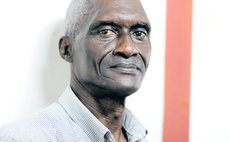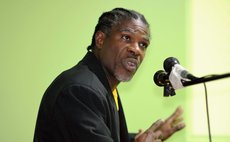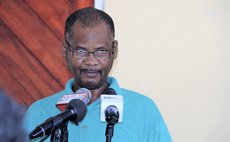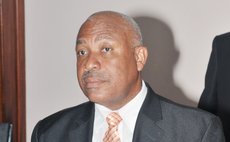Dominica: Walking the Haitian Economic and Political Tightrope?
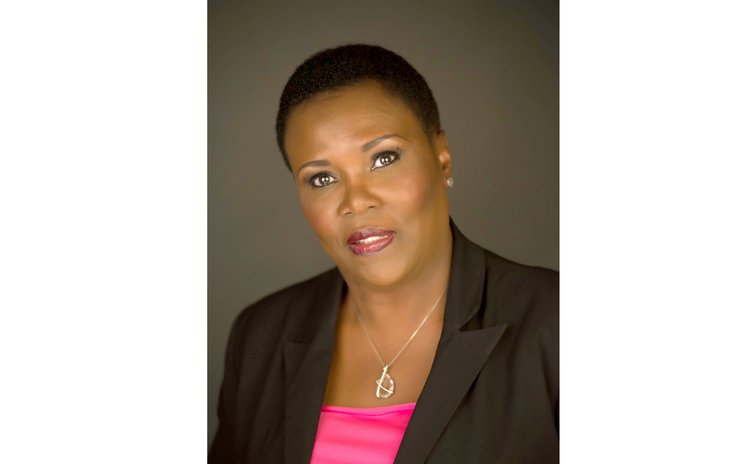
By Rebecca Theodore While the Dominica government remains mired in controversies of incompetence, corruption, a stagnant economy, and blatant disregard for the Constitution and the rule of law, Dominicans are walking backwards on a Haitian economic and political tightrope. A blindfold surrounds their eyes. Their heart is heavy, yet they can't dare to speak. The economic and political aspects of Dominica's history is now understood within the same lens of Haitian history.
Dominica history books indicate that Dominica won its status to independence in 1978 from Great Britain as a symbol of victory over oppression, and was geared to become a great nation. The island flourished and witnessed glorious days under visionaries like Edward Oliver Leblanc and Dame Mary Eugenia Charles. Together, they aided the long battle of colonial struggle against imperialism. Now, a deep political partisanship and plutocracy defines the economic and political process in Dominica, under the embattled governance of the Dominica Labor Party.
Statistics illustrate that after more than 16 years of Labour Party rule in Dominica, press freedom and individual rights and dignity are suppressed, and an electoral system lies crippled by the forces and dictates of government appointed attorneys and advisers. Ignoring the proposals of the Organisation of American States (OAS) 2009 request for voter ID cards, the Skerrit-led administration refuses to revise the electoral system in Dominica, and instead, continues to manipulate the citizenry with pictorial ambitions of developments in hopes of buying the minds and consciences of the Dominica people at the voter's booth.
And in the meantime, Dominica's sale of diplomatic passports from the Citizenship by Investment programme continues to threaten global security. Manipulation of the judicial system cripples the national understanding of law and order in Dominica. Money laundering activities and cases involved in external proceeds from fraudulent investment schemes are rife. The actions of the so-called elites intensify poverty, while the beleaguered administration of Roosevelt Skerrit continues to use its power to aid its own selfish purposes, debasing Dominica with their greed and profligacy.
But how did the Caribbean island of Dominica get to this dark place?
Confirmed reports detail that apart from being allied with Iran, and other countries hostile to U.S interest, the Skerrit government has been working with Venezuela, an authoritarian state to oppose US interest and freedom of expression in the region. Political analyst concludes, that the Caribbean island of Dominica is now faced with a political crisis, that continues to undermine the tenets of democracy, thus creating an impugn to press freedom, human rights, and the rule of law. It seems that the misfortunes of Dominicans are now the good fortune of a kleptocratic government, that is now busy campaigning in town hall meetings across the island in hopes of delivering a snap election on the people. With every passing week, the Dominica Labor Party is acting less like a political party and more like an 'ecumenical church' where parishioners beg for food, shelter, and the basic tools of economic empowerment and survival.
Yet, the faith of a blind display prevails among the followers.
And while Dominicans walk the length of this political tightrope, the so-called elites and their corrupt leader control the strings. Here, the Orwellian drama of 'newspeak' and 'double think' are in full bloom, as the seizure of the free independent press by the ruling administration is now the propaganda machine for partisan politics. The people of Dominica are deprived and depressed on that economic and political tightrope while the elites are safe on the other end. On that axle stretch, the rope is strung tight around the necks of a liquored and illiterate mob, prone to misunderstanding. They live illusive lives in the hope that their pictorial lives they were promised by their leader will somehow burst into reality. Curved over that tightrope, they don't know the difference between delusion from reality. Like fools, they dance and dither on this besieged line, carrying their leaders' burden on their backs.
Undoubtedly, the power of elitism in Dominica brandishes a major challenge to freedom from tyranny. Elitism continues to magnet the representation of the social class in Dominica with subverted meaning that calls into play the narrative gaps of oppression, subservience, and the status of victimhood on the poor people of Dominica. Like the elite of Haiti's era, the economic and political process clearly demonstrate the rotten nature of the nascent bourgeoisie in Dominica.
According to US intelligence statistics, Dominica is the second poorest country in the western hemisphere with a life expectancy of 76.6 years. Only 10% of Dominicans hold an academic degree. With a gross domestic product (GDP) (purchasing power parity) of $812 million (2016 est.), 70% of Dominicans are now living below the poverty line. Agriculture, accounts for about 21% of GDP, but now agricultural production is on a steady decline. Tourism is slow to develop because of poor transport, the absence of an international airport, the lack of hotel facilities, and the criminal reputation of its leader within the international community.
Against this backdrop, a financial crisis looms in Dominica. The United Nations Sustainable Development Goals now competes with a modern-day dilemma where elitism, corruption, and incompetency stifles progress towards the elimination of poverty and hunger, and improving health and education.
In Dominica, the industry, innovation and infrastructure needed to promote inclusive and sustainable industrialization and foster innovation lags behind in beautiful pictures of hospitals, schools and village resettlements. However, these pictorial developments may never be brought to reality because more time and money were spent on crafting these pictures to deceive the people, more than on delivering a sustainable method of development to satisfy their needs. The guarantee of gender equality for women and girls and equality for the LGBT community are not included in the Dominica Constitution. Youth and adults lack basic literacy skills. Child and maternal mortality rate are on the increase. Agriculture, which is the single largest employer in the world has been traded for diplomatic passport sales to money launderers and fugitives from justice who pose continuing threat to global peace and security. In time, there will be a decline in food security that will present severe economic advantages for the Dominica people.
For sure, the United Nations Sustainable Development Goals dents its ecological purposes on the Caribbean island of Dominica.
It is not clear what the political outcome of Dominica will be in the next general election after more than 16 years of dictatorship and economic and political dysfunction. Nevertheless, when viewed within the historical Haitian lens, it is clear to see that power corrupts and absolute power corrupts absolutely.
The reputation of Dominica on the international arena longs for restoration. For this, the Dominica people seek the help of the Commonwealth of Nations, the UN, ECLAC and other specialized agencies to forge a shared moral compromise that can serve as a stimulus for action and save Dominica and the Dominican people from the disastrous scourge of poverty, hunger and displacement.
The political will of the Dominica people cannot continue to be bought by the incompetency and corruption of its leader, and an embryonic bourgeoisie that cares nothing about the high level of poverty and illiteracy that the people of Dominica are presently facing.
Indisputably, the economic and political aspects of Dominica are now intertwined with Haiti, proving that Caribbean narratives are stories that unfold in time. By surveying the economic, political, and historical origins, Dominica has written its autobiography on the Haitian slate, hence, creating a glue to a colonial past of shame, hunger, and abject poverty at the hands of their leaders.
Thus is mirrored the Dominica people walking the Haitian economic and political tightrope.

